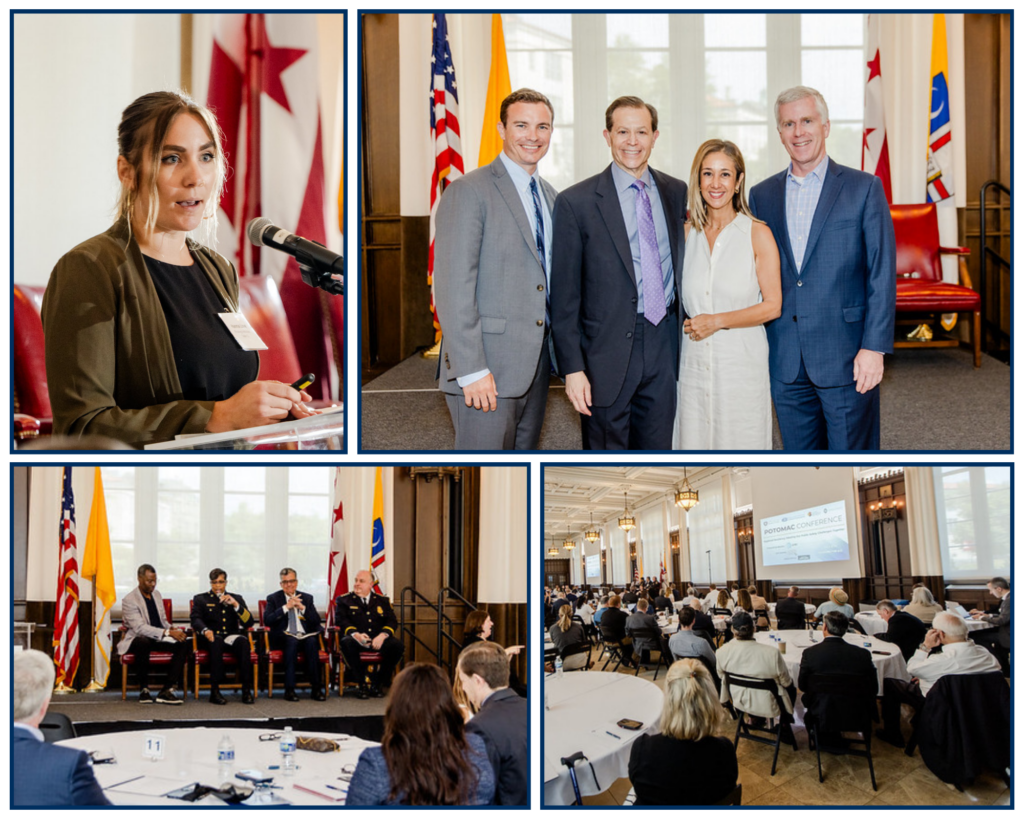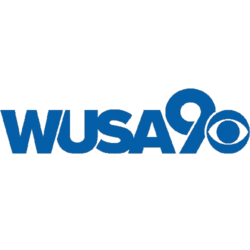Potomac Conference: Regional leaders and stakeholders collaborate of public safety
After a 12-year hiatus, the Potomac Conference met at the Catholic University of America on July 9 to discuss the region’s economy, transportation, and security, focusing on one key point – public safety.
The Conference – co-hosted by the Greater Washington Board of Trade (GWBOT), the Greater Washington Partnership (GWP), the Metropolitan Washington Council of Governments (COG), and the Consortium of Universities of the Washington Metropolitan Area (Consortium) – brought together leaders in the region’s government, law enforcement, non-profit, private, and academic sectors, where they had the opportunity to address the critical issue of ensuring safe communities while strengthening economic growth.
The morning began with welcome remarks from Kathy Hollinger, President and CEO of GWP, who thanked sponsors and partners before introducing the Keynote Speaker. Acting Associate Attorney General Benjamin Mizer delivered his Keynote Address, providing attendees with an overview of the national landscape and climate of public safety.
Andrew Flagel, President and CEO of the Consortium, also provided insight on the role of the region’s universities in promoting public safety before introducing a data-driven discussion on violence impacting the region, presented by Hanna Love of the Brookings Institute.
Love introduced her work at the Brookings Metro’s Bass Center for Transformative Placemaking, showcasing both the perceptions and realities of crime in the region. While local perceptions of crime spoke to a fear of its intensification, crime trends in downtown D.C. did not dramatically change. It was also made clear that place matters regarding types of crime and the necessary responses. Love called attention to a multifaceted approach to reducing crime, focusing on investments in economic stability, housing, access to quality education, and the built environment.

Take a look at more photos from this event
Collaboration for Success Panel
Strategies, Resources, and Building Community Trust for Public Safety
The Executive Director of COG, Clark Mercer, addressed the importance of partnerships between local governments and institutions before introducing a panel that illustrated such cross-sector collaboration. Moderated by Elliott Ferguson, President & CEO of Destination DC, the panel included Chief Pamela Smith of the Metropolitan Police Department, Metro Transit Chief Michael Anzallo of WMATA, and President Peter Kilpatrick of Catholic University.
The three panelists answered several questions regarding their roles in public safety and crime reduction and provided insight on what was being done within their institutions to address the issues. A key point was the importance of partnerships between law enforcement, private and public institutions, and the Greater Washington community at-large.
Chief Smith emphasized the MPD’s Real Time Crime Center and its new community camera sharing program, CameraConnect DC, through which anyone can connect their security cameras to help law enforcement more accurately solve cases and obtain footage.
“One of the things that we’ve launched with the Real Time Crime Center is the ability to be able to connect your cameras,” said Chief Smith. “We are asking you, your partners, your business, please connect your cameras to our Real Time Crime Center. If you have business, mom-and-pop stores, we really want to use your cameras.”
Strategizing for a Thriving Region Workshop
Emergency Communications: First Net Case Study
The workshop portion of the day, focused around discussing and amplifying resources for a thriving region, was moderated and led by Jack McDougle, President and CEO of GWBOT. The first discussion centered on FirstNet – or First Responder Network Authority – a nationwide communication network for first responders overseen by Congress and AT&T. Melissa Ayala, Assistant VP of Government Programs at AT&T, provided updates on a new phase of FirstNet, including standalone 5G and expanded coverage. Many attendees expressed the need for closing the communication gap about public safety updates between organizations and law enforcement, reinforcing a core theme of the conference – public safety goes beyond policing.
Prevent Gun Violence: Research, Empowerment, Strategies and Solutions
The second workshop focused on gun violence and the role of businesses and communities to provide resources and support for its mitigation. Dr. Joseph Richardson laid out data collected through his work as Co-Director of PROGRESS at the University of Maryland, an initiative centered around preventing gun violence with multi-disciplinary, community-based approaches.
Key metrics stood out from this presentation, including a sobering view on the differences in life expectancy within D.C. itself – one loses 21 years of life expectancy in a 41-minute metro ride across the city from Northwest D.C. to Southeast D.C., according to Richardson’s work on contributing factors that lead to this statistic, which include disparities in economic investments and violent crime in these parts of the District.
Dr. Richardson also shared severe discrepancies in the cost of homicides versus investment in research and implementation, with gun violence costing America over $500B per year but only about $25 million invested in 2020 by the federal government in prevention research.
Attendees shared local stories and company ventures looking to combat this issue by providing after-school programs and gainful employment opportunities, giving those at risk another option beyond resorting to gun violence. Businesses have a responsibility to provide opportunities, many affirmed, with ideas such as increasing involvement to the community and opening hiring to those not “traditionally employable” discussed.
Barriers to Retaining and Attracting Business to the Region
The final workshop began with remarks from Colleen Hawkinson, Executive Director of the DC BID Council, and Shawn Townsend, President & CEO of the Restaurant Association of Metropolitan Washington.
Hawkinson reaffirmed the importance of public-private partnerships, especially in the DC BID council towards fostering DC’s Business Improvement Districts, while Townsend relayed the hospitality industry’s continued post-pandemic struggles, but also the sector’s focus on economic development and safety.
The workshop included suggestions such as promoting downtown safety and economic growth by recovering vacant spaces, making these vacancies attractive for businesses. The discussion centered again on providing accessible jobs for young people and creating pathways within those jobs for credential building, school programs, and career growth.
The Greater Washington Board of Trade was thrilled to help host and collaborate on this landmark event with our partners, multilateral institutions, businesses, and agencies in the region. Thank you to everyone who joined us at the Potomac Conference to facilitate cross-sector dialogue in the region and explore innovative, actionable approaches to enhancing community safety and economic stability.
Thank you to our presenting sponsor AT&T, host sponsor Catholic University of America, and our media partner the Washington Business Journal for being a part of the Potomac Conference and helping promote the Greater Washington region.
In The News
DC police chief asks small business owners to help stop crime – WTOP News
Greater Washington Partnership, Board of Trade collaborate on Potomac Conference – Washington Business Journal (bizjournals.com)
Greater Washington Board of Trade relaunches annual Potomac Conference – Washington Business Journal (bizjournals.com)
Become a member today
We need your voice at the table to make Greater Washington a place where everyone can succeed



















